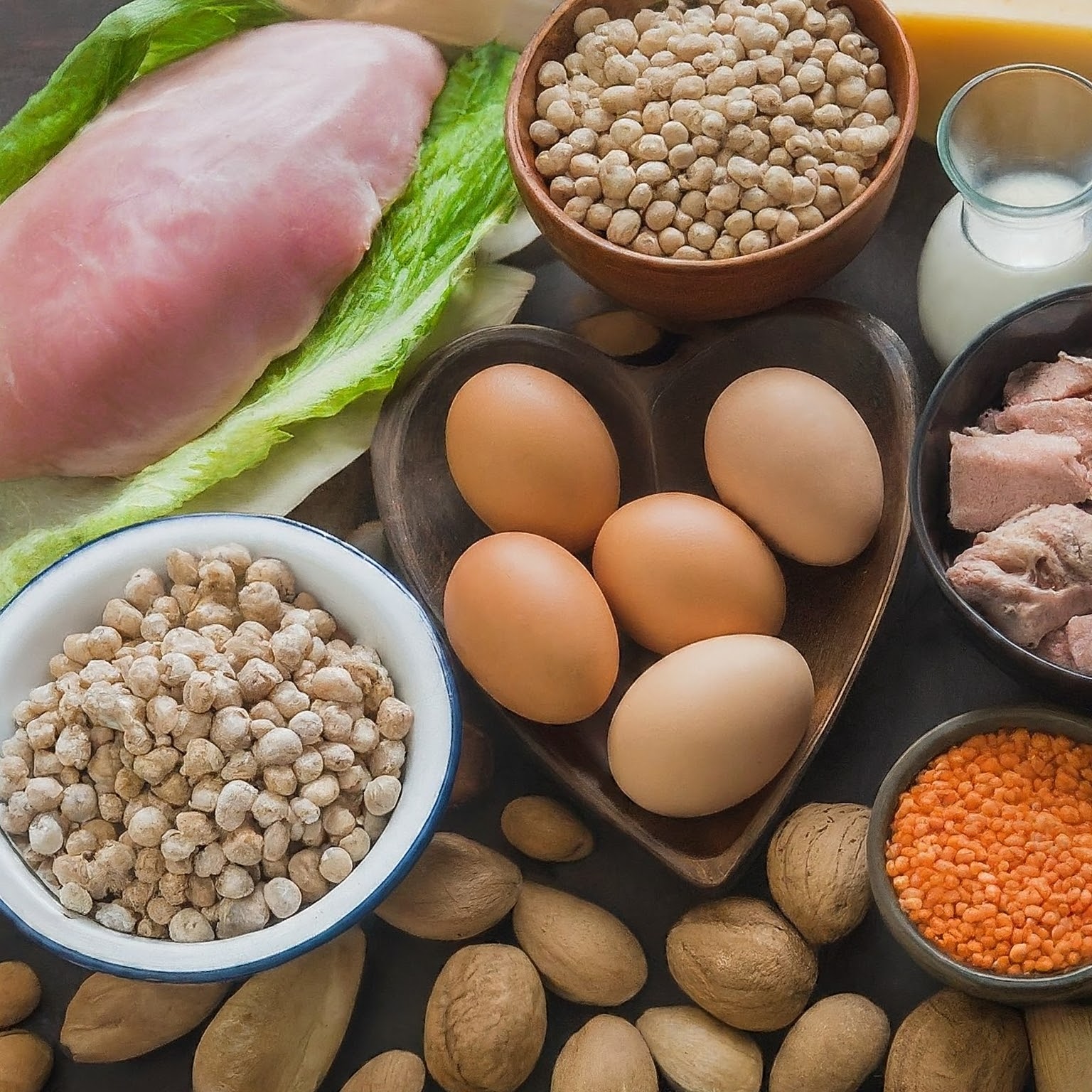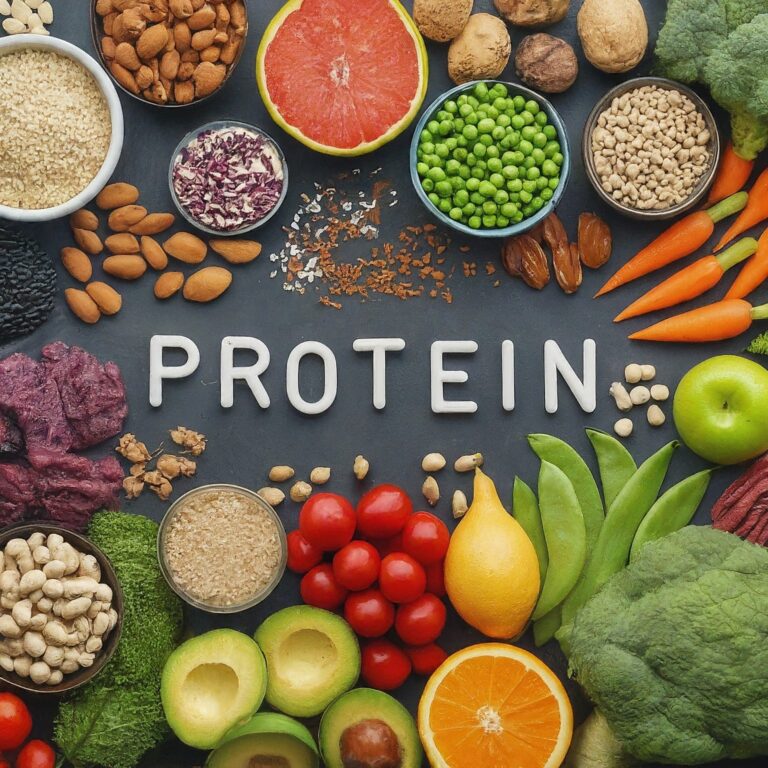Table of Contents
Protein stands as a most important nutrient within the framework of a nutritious regimen, representing an important macronutrient that helps us in many physiological operations. Protein often called as “Building blocks of body” is crucial for the preservation and restoration of tissues, the synthesis of enzymes and hormones, and the helps in overall health. Unlike lipids and carbohydrates, which the body has the capacity to reserve, protein needs consistent consumption, as it cannot be stored in body for future utilization.
In this article, i will discuss the paramount importance of protein, discussing all aspects associated with both inadequate and excessive intake of other macronutrients such as carbohydrates, and furnish a important list of the top 10 protein-abundant foods that should be included into your dietary regimen. Moreover, we shall dive into the potential health adverse effects of protein insufficiency and advise strategies to avoid them.
The Critical Role of Protein in Human Nutrition
Protein is most important for the human body, serving as a most vital nutrient in growth, maintenance, and recovery from illness or exertion. Whether you are recovering post-exercise, striving to manage your weight, or simply endeavoring to maintain good health, protein is your most vital companion.
Core Functions of Protein
- Muscle Hypertrophy and Recovery: Protein is important for the repair and hypertrophy of muscles, particularly post-exertion. It facilitates the mending of microtears in muscle fibers incurred during physical exertion, thereby promoting muscle growth.
- Weight Regulation: A protein-rich diet can attenuate hunger and enhance satiety, prolonging the sensation of fullness. This can help in weight regulation and adipose tissue reduction by reducing overall caloric intake.
- Immune System Fortification: Proteins are vital in the production of antibodies, which are helpful for immune defense. A protein-rich diet can boost your immune system.
- Hormone and Enzyme Synthesis: Proteins are utilized in the synthesis of hormones that regulate various bodily functions, including metabolism, as well as enzymes that facilitate digestion and other biochemical processes.
Protein Role In Body Composition
Protein is also an important part of body composition, along with its functions. It helps in the preservation of lean muscle mass, especially during weight loss journey. Unlike adipose tissue, which can be stored in body, muscle is metabolically active tissue that demands energy for maintenance. By consuming adequate protein, you support the preservation of muscles, thereby maintaining an active metabolism and helping in fat loss.
The Dangers of Excessive Carbohydrate Intake
Carbohydrates are also vital energy source, but their overconsumption can cause many health problems. Diets with high carbohydrate content, particularly those with refined sugars and grains, are frequently associated with weight gain, insulin resistance, and an elevated risk of chronic diseases such as type 2 diabetes and cardiovascular disease.
Health Complications Associated with High-Carbohydrate Diets
- Type 2 Diabetes: Overeating of carbohydrates, especially refined ones like white bread and sugary sweets, can lead to insulin resistance. This condition hinders the body’s ability to regulate blood glucose levels, increasing the risk of type 2 diabetes.
- Obesity: Diets rich in carbohydrates tend to be calorie-dense and can contribute to weight gain, particularly when combined with a sedentary lifestyle. Excessive carbohydrate consumption results in the storage of extra calories as fat, leading to obesity over time.
- Cardiovascular Disease: Diets high in refined carbohydrates are linked to elevated levels of triglycerides, a type of lipid found in the bloodstream, which can increase the risk of cardiovascular disease.
- Inflammation: Excessive intake of carbohydrates can induce chronic inflammation, a condition associated with a variety of health issues, including cardiovascular disease, diabetes, and certain forms of cancer.
Protein Deficiency: Consequences of Inadequate Protein Intake
Just as an excess of carbohydrates can endanger health problems, so too can a deficiency in protein. Protein deficiency is a state in which the body does not receive sufficient protein to fulfill its needs, leading to a many health complications.
Conditions Arising from Protein Deficiency
- Kwashiorkor: A severe form of malnutrition caused by an inadequate intake of protein, kwashiorkor is most commonly observed in children in developing nations. Symptoms include edema (swelling), hepatomegaly (enlarged liver), hair thinning, and abdominal distention.
- Marasmus: Another severe malnutrition disorder, marasmus results from a generalized caloric deficiency, including protein. It manifests as extreme weight loss, muscle wasting, and a compromised immune system.
- Sarcopenia: As individuals age, there is a natural decline in muscle mass, but a protein-deficient diet can accelerate this process, leading to sarcopenia. This condition complicates the maintenance of muscle strength, thereby increasing the risk of falls and fractures.
- Fatty Liver: Protein deficiency can result in fatty liver, a condition characterized by the accumulation of fat within liver cells. If left unaddressed, it can progress to liver inflammation (steatohepatitis), fibrosis, and even cirrhosis.
- Compromised Immune Function: Without adequate protein, the body struggles to produce sufficient immune cells, rendering you more susceptible to infections and illnesses.
- Dermal, Hair, and Nail Issues: Protein is essential for the health of skin, hair, and nails. A deficiency can lead to hair thinning, brittle nails, and dry, flaky skin.
Symptoms of Protein Deficiency
- Muscle Atrophy: A deficiency in protein can lead to muscle atrophy, wherein muscle tissue is broken down to meet the body’s protein needs.
- Edema: Protein plays a role in regulating fluid balance in the body. Insufficient protein intake can result in edema, characterized by swelling in the legs, feet, and other body parts.
- Lethargy and Weakness: Protein deficiency can lead to general feelings of lethargy and weakness, as the body lacks the necessary fuel to function optimally.
How Protein-Dense Foods Can Prevent Deficiency
Incorporating protein-rich foods into your diet is crucial to avoid the risks associated with protein deficiency. A balanced diet that includes a variety of protein sources can help you maintain muscle mass, support immune function, and promote overall health.
Top 10 Protein-Dense Foods to Include in Your Diet

- Eggs
- Protein Content: 6 grams per large egg
- Eggs are a nutritional powerhouse, providing all the essential amino acids your body requires. They are an excellent source of high-quality protein and are rich in vitamins, minerals, and healthy fats. Eggs are versatile and can be prepared in numerous ways, making them a convenient option for any meal.
- Chicken Breast
- Protein Content: 31 grams per 100 grams
- Chicken breast is a lean, high-protein food that is low in fat, making it ideal for muscle growth and repair. It is also a rich source of B6 vitamins, which aid in energy metabolism. Chicken breast can be grilled, baked, or sautéed, offering versatility in meal preparation.
- Greek Yogurt
- Protein Content: 10 grams per 100 grams
- Greek yogurt is thicker and creamier than regular yogurt, with a higher protein content per serving. It is also rich in probiotics, which promote gut health. Greek yogurt can be enjoyed on its own or with fruits, nuts, or honey for added flavor and nutrition.
- Lentils
- Protein Content: 9 grams per 100 grams
- Lentils are a formidable source of plant-based protein, making them an excellent choice for vegetarians and vegans. They are also high in dietary fiber, aiding in digestion and satiety. Lentils are versatile and can be incorporated into soups, stews, salads, or as a side dish.
- Almonds
- Protein Content: 21 grams per 100 grams
- Almonds are a nutrient-dense snack, offering protein along with healthy fats, fiber, vitamins, and minerals such as vitamin E and magnesium. They can be enjoyed on their own or added to salads, yogurts, or smoothies. Almonds also possess antioxidant properties, which help protect cells from damage.
- Cottage Cheese
- Protein Content: 11 grams per 100 grams
- Cottage cheese is rich in casein protein, a slow-digesting protein that is ideal for muscle maintenance and repair. It is low in fat and calories, making it a good option for weight management. Cottage cheese can be eaten on its own, with fruit, or added to various dishes for an extra protein boost.
- Quinoa
- Protein Content: 8 grams per 100 grams
- Quinoa is a complete protein, containing all nine essential amino acids. It is also gluten-free and rich in fiber, magnesium, and other essential nutrients. Quinoa can be used as a base for salads, in soups, or as a side dish, making it a versatile and nutritious addition to your diet.
- Tuna
- Protein Content: 30 grams per 100 grams
- Tuna is a lean source of protein, also rich in omega-3 fatty acids, which benefit heart health. It is a versatile ingredient that can be used in salads, sandwiches, or enjoyed on its own. However, it is important to consume tuna in moderation due to its mercury content.
- Tofu
- Protein Content: 8 grams per 100 grams
- Tofu, made from soybeans, is a popular plant-based protein source, especially among vegetarians and vegans. It is low in calories and contains all the essential amino acids. Tofu can be grilled, stir-fried, or added to soups and salads for a protein boost.
- Lean Beef
- Protein Content: 26 grams per 100 grams
- Lean beef is an excellent source of high-quality protein and is rich in iron, zinc, and vitamin B12. It is a great option for muscle growth and repair, as well as overall health. Lean beef can be grilled, baked, or stir-fried, and can be incorporated into various dishes for a protein-packed meal.
So, Protein is not just a macronutrient; it is most important nutrient upon which our health is built. A diet with protein-rich foods is indispensable for the preservation of muscle mass, the regulation of metabolism, and the enhancement of immune function. By understanding the critical role of protein, recognizing the dangers of excessive carbohydrate intake, and being aware of the consequences of protein deficiency, you can make informed dietary choices that support your long-term health and well-being.




Pingback: Top 10 Potassium-Laden Foods: Know why Potassium is absolutely important for body ? - Healing Doctor
Pingback: Say Goodbye to Bloating: 20 Proven Tips to Relieve Belly Swelling Fast - Healing Doctor
Pingback: Kidney Stones: Symptoms, Types, Causes, Treatment, and Prevention - Healing Doctor